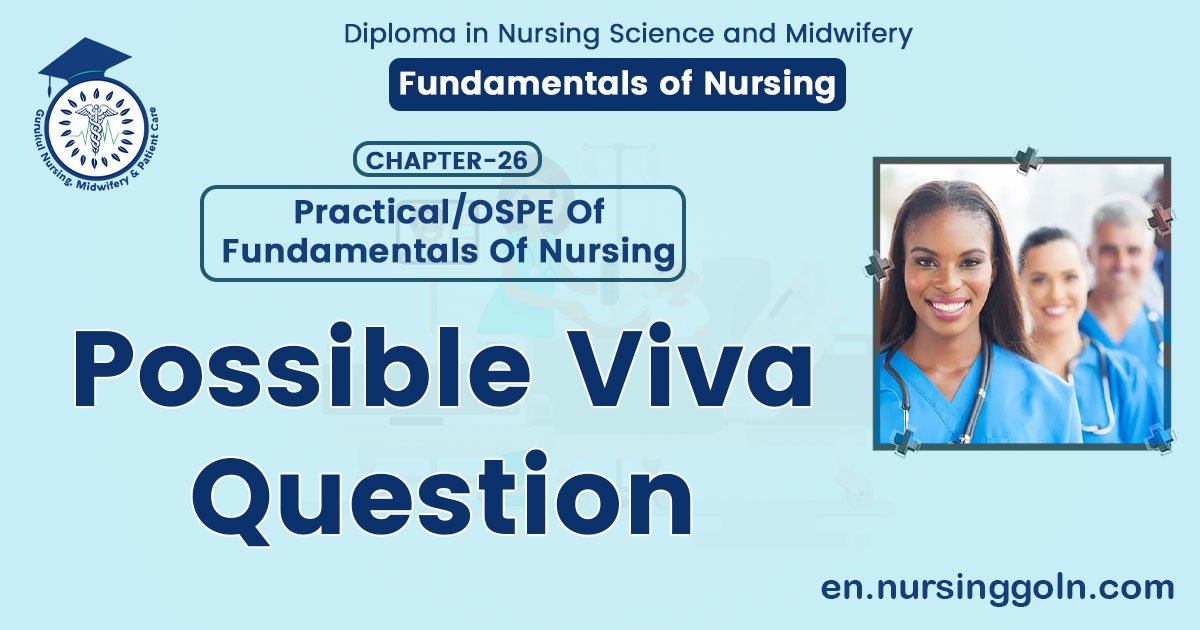Possible Viva Question – Nursing is a profession within the healthcare sector focused on the care of individuals, families, and communities so they may attain, maintain, or recover optimal health and quality of life. Nurses may be differentiated from other healthcare providers by their approach to patient care, training, and scope of practice. Nurses practice in many specialisms with differing levels of prescriber authority.
Many nurses provide care within the ordering scope of physicians, and this traditional role has shaped the public image of nurses as care providers. However, nurses are permitted by most jurisdictions to practice independently in a variety of settings depending on training level. In the postwar period, nurse education has undergone a process of diversification towards advanced and specialized credentials, and many of the traditional regulations and provider roles are changing.

Nurses develop a plan of care, working collaboratively with physicians, therapists, the patient, the patient’s family, and other team members, that focus on treating illness to improve quality of life. Nurses may help coordinate the patient care performed by other members of an interdisciplinary healthcare team such as therapists, medical practitioners, and dietitians. Nurses provide care both interdependently, for example, with physicians, and independently as nursing professionals.
Possible Viva Question
FUNDAMENTALS OF NURSING
- Define communication.
- State the types of communication.
- What do you mean by BNMC codes of conduct?
- Mention at least 3 clause codes of ethics and professional conduct.
- What do you mean by professional misconduct?
- List the purposes of therapeutic communication in nursing.
- What are the benefits if empathy to clients and colleagues?
- What do you mean by client centre care?
- What do you mean by accountability in nursing practice?
- State the types of communication with example.
- What are the components of ethical consideration?
- What is nursing process?
What are the importance of hand washing? - Mention the least two nursing roles and competencies.
- Mention two roles and function of social workers
- What are the basic concepts relevant of nursing?
- What kinds of problem / complication may arise due to I/V infusion.
- What is nasogastric tube feeding?
- List the indication of nasogastric tube feeding.
- What are the functions of DGNM?
- List 8 major ingredients/components of moral and ethical behavior system?
- What are the types of care facilities within health care delivery system?
- What are sources of lawno
- What are the functions of law in nursing?
- Define nursing

- State the aims of nursing.
- Define morality and ethics.
- Mention the public perception of nursing profession.
- What are the components of basic nursing care?
- Define therapeutic relationship.
- What are the elements of the elements of therapeutic relationship?
- Why hand washing is important for nursed during clinical practice?
- What general instruction you follow during the O2 inhalation?
- Define bowel elimination.
- List the common factors which affecting bowel elimination?
- What is enema?
- What are the purposes of enema?
- What are the types of enema?
- What principles may follow during enema?
- What principles may follow during enema?
- What kind of solution used for enema?
- Define & classify enema.
- When do you collect specimen?
- Define blood transfusion.
- Mention the indication of blood transfusion.
- Mention the indication of I/V injection.
- What is tracheostomy?
- What are the purposes of tracheostomy?
- When do you discharge a patient?
- What responsibility for a new admission patient.
- Why communication is important for nursing profession?
- Why accountability is important for a nurse?
- Why do you think that effective communication is important for the nursing?
- Why oxygenation is important for a respiratory distress patient.
- A patient with respiratory distress admitted in a medical ward. Discuss the management of this patient in the ward.
- A 40 years old male patient is admitted in your ward with diabetes mellitus. He needs blood and urine test for sugar. How will you collect this specimen? A 55 years old patient is admitted in your ward. He is unconscious. How will you maintain his
nutrition/how will you feed him? - A patient is admitted in your ward with acute abdomen pain. He is nothing by mouth. He needs 1/V infusion. How will you start his I/V infusion.
- A 45 years old female patient is admitted in your ward with severe anemia. You start blood transfusion. Suddenly the patient feels chills and rigor occur. How will you manage this patient? A 25 years patient is admitted in your ward with acute abdomen pain. His bowel is not moved.
- What kinds of enema simplex will you give her & how will you prepare this solution. You are a student nurse working in a medical ward. A patient comes with CVD. How will you maintain her urinary elimination?
- A 20 years old patient admitted in your ward. He is getting blood transfusion. Sudden he feels allergic reaction. How will you manage this case?
- You are a student you working in the ENT ward. A patient with tracheostomy operation he has profusion secretion. How will you manage this patient?
- You are a student nurse you working in the pediatric ward. A patient come with severe pneumonia with respiratory distress how will you relieve his respiratory distress.
- Prepare an injection trolley.
- Prepare a blood transfusion tray.
- Prepare an oral medication tray.
- Prepare a nasogastric tube feeding tray.
- Prepare a catheter tray.
- Prepare an enema simplex tray.
- Prepare a wound dressing trolley.
- Perform hand washing techniques.
- Perform urine for Benedicts/sugar test technique for urine for sugar test.
- What is specimen?
- What is catheterization?
- What are the types of catheter?
- What are the purposes of urethral catheterization?
- What are the types of urinary catheterization?
- What are the purposes of bladder irrigation?
- What are the types of specimen?
- What are the roles you will follow during the specimen collection?
- What kinds of blood investigation perform in the laboratory?
- How will you take care of oxygen cylinder?
- Why specimen collection is important?
- Why catheterization is important?
- Why indwelling catheter is used?
- Why specimen collection is needed?
- How will you collect 24 hours urine specimen collection?
- How will you collect urine from an indwelling catheter for sugar and acetone?
- How will you collect blood specimen for GTT?
- Why enema is important?
- How will you collect sterile urine specimen?
- How will you prevent a long laying patient from friction?
- How will you feed an unconscious patient?
- Why 1/V fluid are important of a patient with severe diarrhea
- Why tracheostomy suctioning is important of a tracheostomy patient.
- Why blood transfusion important?
- Why nasogastric tube feeding is important of a unconscious patient?
